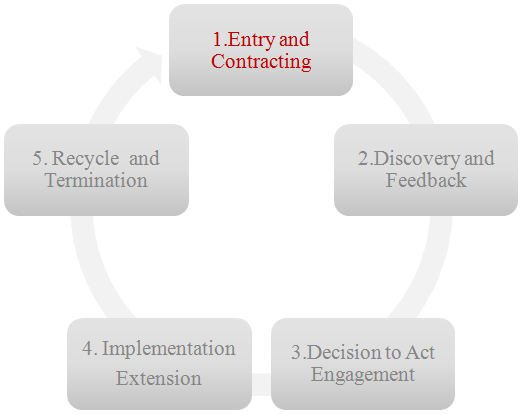Research Paper By Andrea Briscoe
(Life Coach, UNITED STATES)
Why first impressions are important.
In this writing I have set out to explain why the initial stages and meeting of any coaching engagement are important and should not be overlooked. I have utilized some concepts found in consulting, evidence based coaching, appreciative inquiry and a case study to round out my work and support my hypotheses of the importance to this phase of any coaching engagement.
The International Coach Federation defines coaching in the following way:
Professional coaches provide an ongoing partnership designed to help clients produce fulfilling results in their personal and professional lives. Coaches help people improve their performances and enhance the quality of their lives.
It is important to recognize that we are all using a common definition of terms when it comes to coaching and this one seems to capture the essence of the coaching profession. As we look at the definition of coaching and look at it in individual pieces it then becomes an ongoing partnership designed to help client produce fulfilling results in their lives. Reaching this wonderful goal with our clients would not be possible without the ability to manage expectations with both the client and the coachee and determine what is in store for each participant and determine if there is a good fit between the coach and the coachee.
Before delving into the coaching model it is also important to look to the ICF competency of “Establishing the Coaching Agreement.” We will talk more about this later, however in pertinent part this competency outlines the need for the client and coach to come to an agreement about the coaching process and their relationship. It requires establishing the rules of engagement and what the client would like to work on for a particular period of time. This ICF competency provides a great starting point for the work that we will discuss.
In order to begin to examine this coaching relationship I have used a consulting model created by Peter Block in his book Flawless Consulting. I know that coaching and consulting are different animals one that evaluates problems and suggests answers and another that helps clients produce results that are helpful to them and enhance the quality of their lives. Hopefully, however you will see that Peter Blocks framework provides a useful structure for the discussion that follows.
There are many consulting models that can be used as a construct for thinking about a task For example there is “plan, do, reflect, change”, which is simple and creates a circular motion of thinking about solving a problem. In his book Flawless Consulting Peter Block looks uses a 5 phase approach and contends that you can use these phases anytime that you enter into a consulting relationship. Block also contends that we are all consultant anytime anyone asks us to help with anything. Examples of this might be directions to a restaurant, appropriate bridesmaid gowns or how to staff and structure leadership change in a large corporation.
I am using the first phase of this model to illustrate the importance of entry and contracting as we enter a coaching relationship.
This first phase deals with the initial contact with the client about the engagement.

